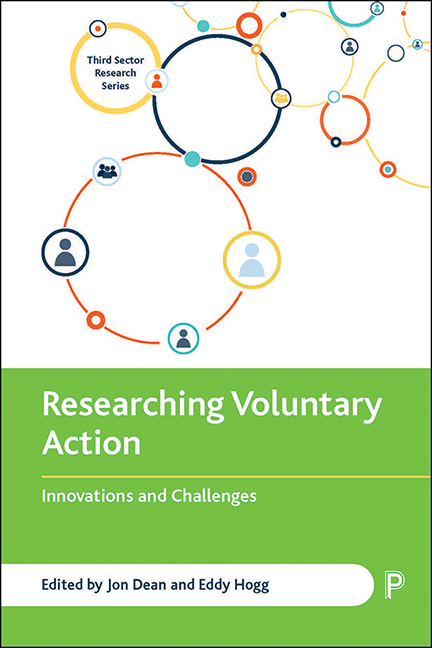Book contents
- Frontmatter
- Contents
- List of figures, tables and boxes
- Notes on contributors
- Acknowledgements
- Series editor’s foreword
- 1 Introduction
- 2 (Un)suitable methods and reflexive considerations: an interview and focus group study of youth volunteering
- 3 Interpretive ethnography: a UK charity shop case study
- 4 Collaborative philanthropy and doing practically relevant, critical research
- 5 Peer research: co-producing research within the context of voluntary and community action
- 6 Charity advertising: visual methods, images and elicitation
- 7 Using archives and objects in voluntary action research
- 8 Using Mass Observation as a source of qualitative secondary data for interdisciplinary longitudinal research on voluntary action
- 9 Investigating meanings and messages on volunteering through television media
- 10 Annual reporting in voluntary organisations: opportunities for content analysis research
- 11 Researching risk in the voluntary sector: the challenges and opportunities of regulatory data
- 12 Exploring the benefits of volunteering: combining survey and administrative data in the Nordic ‘laboratory’
- 13 Spatial approaches to the voluntary sector
- 14 Restudies, surveys and what counts as volunteering
- 15 Conclusion
- References
- Index
14 - Restudies, surveys and what counts as volunteering
Published online by Cambridge University Press: 15 September 2022
- Frontmatter
- Contents
- List of figures, tables and boxes
- Notes on contributors
- Acknowledgements
- Series editor’s foreword
- 1 Introduction
- 2 (Un)suitable methods and reflexive considerations: an interview and focus group study of youth volunteering
- 3 Interpretive ethnography: a UK charity shop case study
- 4 Collaborative philanthropy and doing practically relevant, critical research
- 5 Peer research: co-producing research within the context of voluntary and community action
- 6 Charity advertising: visual methods, images and elicitation
- 7 Using archives and objects in voluntary action research
- 8 Using Mass Observation as a source of qualitative secondary data for interdisciplinary longitudinal research on voluntary action
- 9 Investigating meanings and messages on volunteering through television media
- 10 Annual reporting in voluntary organisations: opportunities for content analysis research
- 11 Researching risk in the voluntary sector: the challenges and opportunities of regulatory data
- 12 Exploring the benefits of volunteering: combining survey and administrative data in the Nordic ‘laboratory’
- 13 Spatial approaches to the voluntary sector
- 14 Restudies, surveys and what counts as volunteering
- 15 Conclusion
- References
- Index
Summary
Introduction
In 1996, Nonprofit and Voluntary Sector Quarterly published an article by Ram Cnaan, Femida Handy and Margaret Wadsworth entitled ‘Defining who is a volunteer: Conceptual and empirical considerations’ (Cnaan et al, 1996; henceforth CHW). At the time of writing it has been cited nearly 1,000 times, according to Google Scholar, and is widely known by those researching volunteering as an influential article on how we think about ‘what counts’ as volunteering. Musick and Wilson (2008: 14) rightly refer to CHW's work as ‘remarkable’, arguing that it cements the idea that volunteering is one of very few activities that will take place even if costs exceed rewards, and the more this balance is breached (that is, more cost to the individual in completing the activity), the more the public are likely to classify an activity as volunteering. CHW's work has been extensively built on by its authors in international collaboration to examine volunteering definitions in a cross-cultural context (for example, Handy et al, 2000; Meijs et al, 2003; Liu et al, 2017), showing both that the original instrument has internal reliability, and also how this innovative and malleable piece of work can be applied temporally across cultures.
In the light of the 25th anniversary of this important article's publication, this chapter will first reflect on the significance of CHW's original methodological and knowledge contribution; second, report on an attempt by the authors to replicate and update CHW's work using a revised version of the original survey, exploring the ways in which a new generation conceptualise and define volunteering outside of the US; and third, reflect on the methodological issues at stake. The use of adapted restudies in this field is significant because of the changing nature of (youth) volunteering, particularly in relation to more interventionist government policy in the field and increased necessity for students to volunteer so as to gain experience and derisk the transition from education to work (Dean, 2014) as part of a neoliberal economic and social order.
- Type
- Chapter
- Information
- Researching Voluntary ActionInnovations and Challenges, pp. 160 - 170Publisher: Bristol University PressPrint publication year: 2022



